Chicago Studies in American Politics
A series edited by Benjamin I. Page, Susan Herbst,
Lawrence R. Jacobs, and James Druckman
Also in the series:
ELECTING JUDGES: THE SURPRISING EFFECTS OF CAMPAIGNING ON JUDICIAL LEGITIMACY
by James L. Gibson
FOLLOW THE LEADER?: HOW VOTERS RESPOND TO POLITICIANS POLICIES AND PERFORMANCE
by Gabriel S. Lenz
THE SUBMERGED STATE: HOW INVISIBLE GOVERNMENT POLICIES UNDERMINE AMERICAN
by Suzanne Mettler
DISCIPLINING THE POOR: NEOLIBERAL PATERNALISM AND THE PERSISTENT POWER OF RACE
by Joe Soss, Richard C. Fording, and Sanford F. Schram
WHY PARTIES? A SECOND LOOK
by John H. Aldrich
NEWS THAT MATTERS: TELEVISION AND AMERICAN OPINION, UPDATED EDITION
by Shanto Iyengar and Donald R. Kinder
SELLING FEAR: COUNTERTERRORISM, THE MEDIA, AND PUBLIC OPINION
by Brigitte L. Nacos, Yaeli Bloch-Elkon, and Robert Y. Shapiro
OBAMAS RACE: THE 2008 ELECTION AND THE DREAM OF A POST-RACIAL AMERICA
by Michael Tesler and David O. Sears
FILIBUSTERING: A POLITICAL HISTORY OF OBSTRUCTION IN THE HOUSE AND SENATE
by Gregory Koger
IN TIME OF WAR: UNDERSTANDING AMERICAN PUBLIC OPINION FROM WORLD WAR II TO IRAQ
by Adam J. Berinisky
US AGAINST THEM: ETHNOCENTRIC FOUNDATIONS OF AMERICAN OPINION
by Donald R. Kinder and Cindy D. Kam
THE PARTISAN SORT: HOW LIBERALS BECAME DEMOCRATS AND CONSERVATIVES BECAME REPUBLICANS
by Matthew Levendusky
Additional series titles follow index
The Timeline of Presidential Elections
How Campaigns Do (and Do Not) Matter
ROBERT S. ERIKSON AND CHRISTOPHER WLEZIEN
The University of Chicago Press
Chicago and London
Robert S. Erikson is professor of political science at Columbia University and the author or coauthor of several books, including The Macro Polity.Christopher Wlezien is professor of political science at Temple University and coauthor, most recently, of Degrees of Democracy.
The University of Chicago Press, Chicago 60637
The University of Chicago Press, Ltd., London
2012 by The University of Chicago
All rights reserved. Published 2012.
Printed in the United States of America
21 20 19 18 17 16 15 14 13 12 1 2 3 4 5
ISBN-13: 978-0-226-92214-0 (cloth)
ISBN-13: 978-0-226-92215-7 (paper)
ISBN-13: 978-0-226-92216-4 (e-book)
ISBN-10: 0-226-92214-6 (cloth)
ISBN-10: 0-226-92215-4 (paper)
ISBN-10: 0-226-92216-2 (e-book)
Library of Congress Cataloging-in-Publication Data
Erickson, Robert S.
The timeline of presidential elections : how campaigns do (and do not) matter / Robert S. Erikson and Christopher Wlezien.
pages. cm.(Chicago studies in American politics)
ISBN-13: 978-0-226-92214-0 (cloth : alkaline paper)
ISBN-10: 0-226-92214-6 (cloth : alkaline paper)
ISBN-13: 978-0-226-92215-7 (paperback : alkaline paper)
ISBN-10: 0-226-92215-4 (paperback : alkaline paper)
[etc.]
1. PresidentsUnited StatesElection. 2. Political campaignsUnited StatesHistory. 3. United StatesPolitics and government. I. Wlezien, Christopher. II. Title.
JK524.E84 2012
324.973dc23
2012002385
 This paper meets the requirements of ANSI/NISO Z39.481992 (Permanence of Paper).
This paper meets the requirements of ANSI/NISO Z39.481992 (Permanence of Paper).
ACKNOWLEDGEMENTS
The book has been long in coming. The origins can be traced to our initial collaboration twenty years back. Before the 1992 presidential election, we considered what explanatory models of past presidential elections could tell us about the then upcoming election between George H. W. Bush and Bill Clinton. As it turned out, our forecast was accurate, but it was designed to work near the end of the campaign. Then, starting with the 1996 election, we considered how the effects of the economy come into focus at particular stages in advance of the election. After this, we turned to trial-heat polls of voter preferences between the candidates for the White House, and then began to crystallize our thinking about the campaign timeline. The result of that work is an article in the 2002 Journal of Politics, which introduced our initial thoughts on the subject. In later election years, we began to explore how polls came to reflect the economic fundamentals over time and what they added to our understanding of the outcome. Our book builds on all of this previous work, and develops and extends it in significant ways.
The research would not have been possible without two separate grants from the National Science Foundation. The first enabled us to amass all of the macrolevel poll data, the second to pull together the various microlevel data. We received additional support from Columbia Universitys Institute for Social and Economic Research. For assistance in collecting and organizing the data, we thank Joseph Bafumi, Christopher Carman, Bruce Carroll, Albert Fang, Yair Ghitza, Joe Howard, Kathy Javian, John Kastellec, Jason Kelly, Krystyna Litton, Jeff May, Quinn Mulroy, Sharif Nesheiwat, Eldon Porter, Kelly Rader, Amy Ware, and Alexander Wu. For generously sharing other critical data, we thank Michael D. McDonald, James A. Stimson, and John Zaller.
We have many people to thank for helpful input over the years. There were participants in seminars at Columbia University; the University of Essex; Gallup Organization; Leiden University; the University of Manchester; University of Mannheim; Massachusetts Institute of Technology; University of Minnesota; University of North Carolina; Oxford University; University of Surrey; Texas A&M University; University of Texas, Dallas; Trinity College, Dublin; and Washington University. There were participants in panels at professional meetings in Cardiff, Chicago, Houston, Montreal, San Antonio, Savannah, and Washington, D.C.
A large number of people have made significant comments. Jane Green read every chapter and in great detail and helped us see more clearly at numerous points. Others made important marks, including Cristina Adams, Joseph Bafumi, James Campbell, Tereza Capelos, Harold Clarke, George Edwards, Harry Enten, Geoff Evans, Steve Fisher, Rob Ford, Andrew Gelman, Thomas Gschwend, Michael Hagen, Sunshine Hillygus, Tom Holbrook, Bill Jacoby, Will Jennings, Richard Johnston, Brad Jones, Andrew Karch, Paul Kellstedt, Kathleen Knight, Yph Lelkes, Joseph McLaughlin, Brendan Nyhan, Costas Panagopoulos, Josh Pasek, Colin Provost, Robert Shapiro, Daron Shaw, Michael Sobel, Stuart Soroka, Evan Parker Stephen, Marianne Stewart, Laura Stoker, and Dan Wood. We surely have missed the names of others who contributed in important ways over the long life of the projectwe have tried our best to remember and apologize for not doing better. We also thank the two anonymous reviewers of this book, especially for helping us focus more on the forest and less on the trees.
We also thank people at the University of Chicago Press. Of special note is the contribution of the editors. Jamie Druckman read the book from beginning to end and had an important impact on its parts and their sum. We cant thank him enough. John Tryneski provided critical input and guidance in framing the books contribution. We are grateful for this and for his patience throughout the editorial process. Rodney Powell helped us negotiate final revisions and begin production.
Finally, we owe special thanks to our families for letting us take the time and energy needed to finish the book, something we werent able to do prior to the 2004 and 2008 elections.
ONE
Election Campaigns and Voter Preferences
Imagine the timeline of a presidential election campaign. We begin the timeline at some early point before the election, perhaps as soon as polls ask voters whom they will support. The timeline ends on Election Day. At the beginning, the polls reveal the electorates preliminary vote intentions. On Election Day, at the end of the campaign, the electorate reaches a final verdict. In this book we trace the national vote division as it evolves over the campaign timeline.
Next page
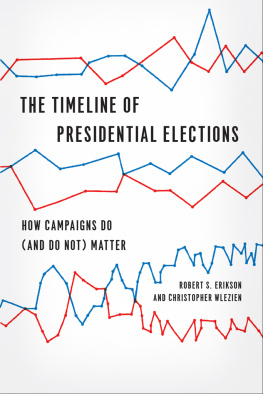
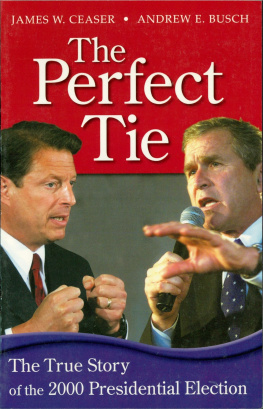
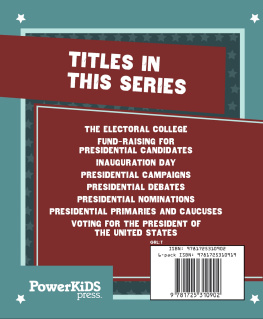

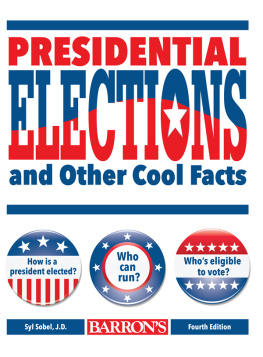
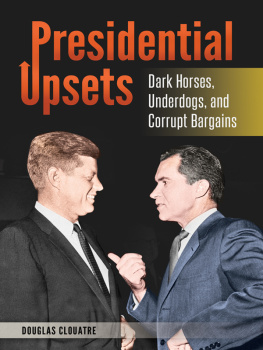
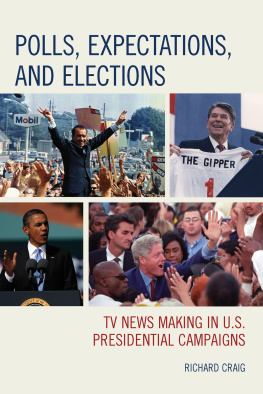
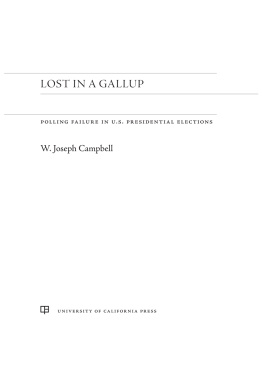
 This paper meets the requirements of ANSI/NISO Z39.481992 (Permanence of Paper).
This paper meets the requirements of ANSI/NISO Z39.481992 (Permanence of Paper).